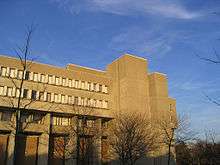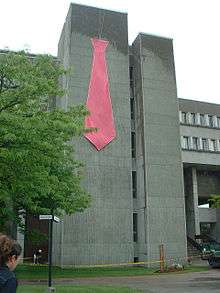University of Waterloo Faculty of Mathematics
| Faculty of Mathematics | |
|---|---|
|
Faculty wordmark | |
| Established | January 1, 1967 |
| Type | Faculty |
| Academic affiliation | University of Waterloo |
| Location | Waterloo, Ontario, Canada |
| Dean | Stephen M. Watt |
| Undergraduates | 6,723 |
| Postgraduates | 857 |
| Doctoral students | 282 |
| Alumni | 29,866 |
| Symbol | Pink tie |
| Website |
uwaterloo |
The Faculty of Mathematics is one of six faculties of the University of Waterloo in Waterloo, Ontario. As of Fall 2015, it has 6,813 undergraduate students and 873 graduate students, 200 full-time professors, and offers over 500 courses in mathematics, statistics and computer science.
The Faculty also houses the David R. Cheriton School of Computer Science, which was formerly the faculty's computer science department.
In the latest release of QS World University Rankings, University of Waterloo is ranked 24th globally for Computer Science and 20th for Mathematics.
History

The faculty was founded on January 1, 1967, a successor to the mathematics department in the Faculty of Arts. Initially located in the Physics building, it was moved in May 1968 into the newly constructed Mathematics and Computer (MC) building.
One of the professors at this school at this time, Ralph Stanton, became legendary among students for wearing gaudy ties. This inspired the students to drape a gigantic pink tie over the MC building on the occasion of its opening, which later became an official mascot of the Faculty.[1]
At the time of its founding, the faculty included five departments: Applied Analysis and Computer Science, Applied Mathematics, Combinatorics and Optimization, Pure Mathematics, and Statistics. In 1975 the Department of Applied Analysis and Computer Science became simply the Department of Computer Science; in 2005 it became the David R. Cheriton School of Computer Science. The Statistics department also was later renamed to Statistics and Actuarial Science.
The Faculty of Mathematics finished construction of a third building, Mathematics 3 or M3, in 2011. It now houses the Department of Statistics and Actuarial Science and a large lecture hall.
Departments
The faculty presently has four departments: Applied Mathematics, Combinatorics and Optimization, Pure Mathematics, and Statistics and Actuarial Science. It also has one school, the David R. Cheriton School of Computer Science. Management responsibilities for Waterloo's Software Engineering program are shared between the Mathematics and Engineering faculties.
Degrees
The Faculty of Mathematics grants the BMath (Bachelor of Mathematics) degree for most of its undergraduate programs. Computer Science undergraduates can generally choose between graduating with a BMath or a BCS (Bachelor of Computer Science) degree. The former requires more coursework in mathematics. Specialized degrees exist for the Software Engineering program (the BSE, or Bachelor of Software Engineering) and Computing and Financial Management (BCFM, or Bachelor of Computing and Financial Management.) Postgraduate students are generally awarded MMath (Master of Mathematics) or PhD degrees.
Student life
Students in the Faculty of Mathematics are represented by the Mathematics Society (MathSoc) which represents student interests to the university, operates the Math C&D cafe, publishes the newspaper mathNEWS, and runs student services including an exam bank and lounge space.[2]
Answerable to MathSoc are the program clubs, which host services and social events (usually) for students in a particular program.[3] These clubs include:
- Actuarial Science Club
- Bioinformatics Club
- Computer Science Club
- Math/Business Double Degree Club
- Mathematical Finance Students Association
- Financial Analysis and Risk Management Students Association
- Pure Math, Applied Math, Combinatorics and Optimization Club
- Statistics Club
- Teaching Students Association
Additionally, all students pay into the Mathematics Endowment Fund (MEF) which funds student projects and improvements to student workspaces.[4]
Undergraduates in the Faculty are frequently colloquially called "Mathies".
Traditions
Tie Guard

The Tie Guard is a yearly tradition at the University of Waterloo. A group of senior math students volunteer for the position each year, and are selected by the University of Waterloo Federation of Students representatives from the Faculty Of Mathematics. It is expected that the appointed Tie Guard volunteers will be on hand at the guard station 24 hours a day for the duration of the orientation week.
The Tie Guard is located outside the Faculty of Mathematics building every September during orientation week at the university, as well as any special occasions when the faculty mascot is hung, and is there to serve two purposes. Firstly, and according to any math student you ask, they are there to guard the Faculty of Mathematics' mascot, a huge 40 foot pink tie which hangs off the side of the building.
Secondly, the Tie Guard acts as a 24-hour first aid station and information centre to support the ongoing activities of orientation week. There is always a member of the Guard present who has been trained in First Aid by a recognized authority such as the St. John's Ambulance or International Committee of the Red Cross. Students from all faculties routinely stop by the guard station to get directions, have questions answered or simply pay homage to the mascot and the Guard.
In truth, it performs both of these tasks largely by its mere presence. By having people present outside the mascot 24 hours a day, it discourages would-be student pranksters from both damaging the tie; or, more likely given the Pink Tie's precarious position on the side of the building, it prevents students from injuring themselves or others in an attempt to capture the mascot.
The Tie Guard was founded in 1994 after several previous attempts on the Pink Tie resulted in both damaged mascots, and injuries to students, the most notorious of which was the Tie Liberation Organization (TLO) kidnapping in 1988. According to urban legend at the university, the dean at the time of the last attack in 1993, proclaimed that if there was another incident involving the mascot, it would be taken down and not put up again. Thus it was, that in 1994, The Tie Guard was founded by then student Marco Koechli, who maintained a vigil by himself for the entire week, encouraged by other students and supporters on the Faculty and Dean's office. In more recent years the tie guard has expanded and now several students are appointed to the Tie Guard each year. A new pink tie was draped over the Mathematics 3 building in 2011.
Pi Day
While celebrating Pi Day (March 14, or 3/14) is common in many departments of mathematics, in the University of Waterloo it is also celebrated in the summer (on July 22, or 22/7, this being Pi Approximation Day) and in the fall (on the 314th day of the year). This was done so that each term - Winter, Spring, and Fall - has a Pi Day. Typical activities include throwing pie at MathSoc executives and/or popular professors, viewing mathematics-related films, competing in Pi recitation contests, and eating pie. (On 22/7, cake is served instead, which is approximately pie.)
Alumni Awards
The Faculty of Mathematics awards two medals annually in recognition of the accomplishments of alumni: the J.W. Graham Medal in Computing and Innovation and the Faculty of Mathematics Alumni Achievement Medal.
References
- ↑ University of Waterloo Website
- ↑ "MathSoc Services". Mathematics Society. Retrieved 26 January 2016.
- ↑ "MathSoc Clubs". Mathematics Society. Retrieved 26 January 2016.
- ↑ "About". Mathematics Endowment Fund. Retrieved 26 January 2016.
External links
| Wikimedia Commons has media related to Mathematics & Computer Building (University of Waterloo). |
Coordinates: 43°28′20″N 80°32′38″W / 43.4721°N 80.5439°W
